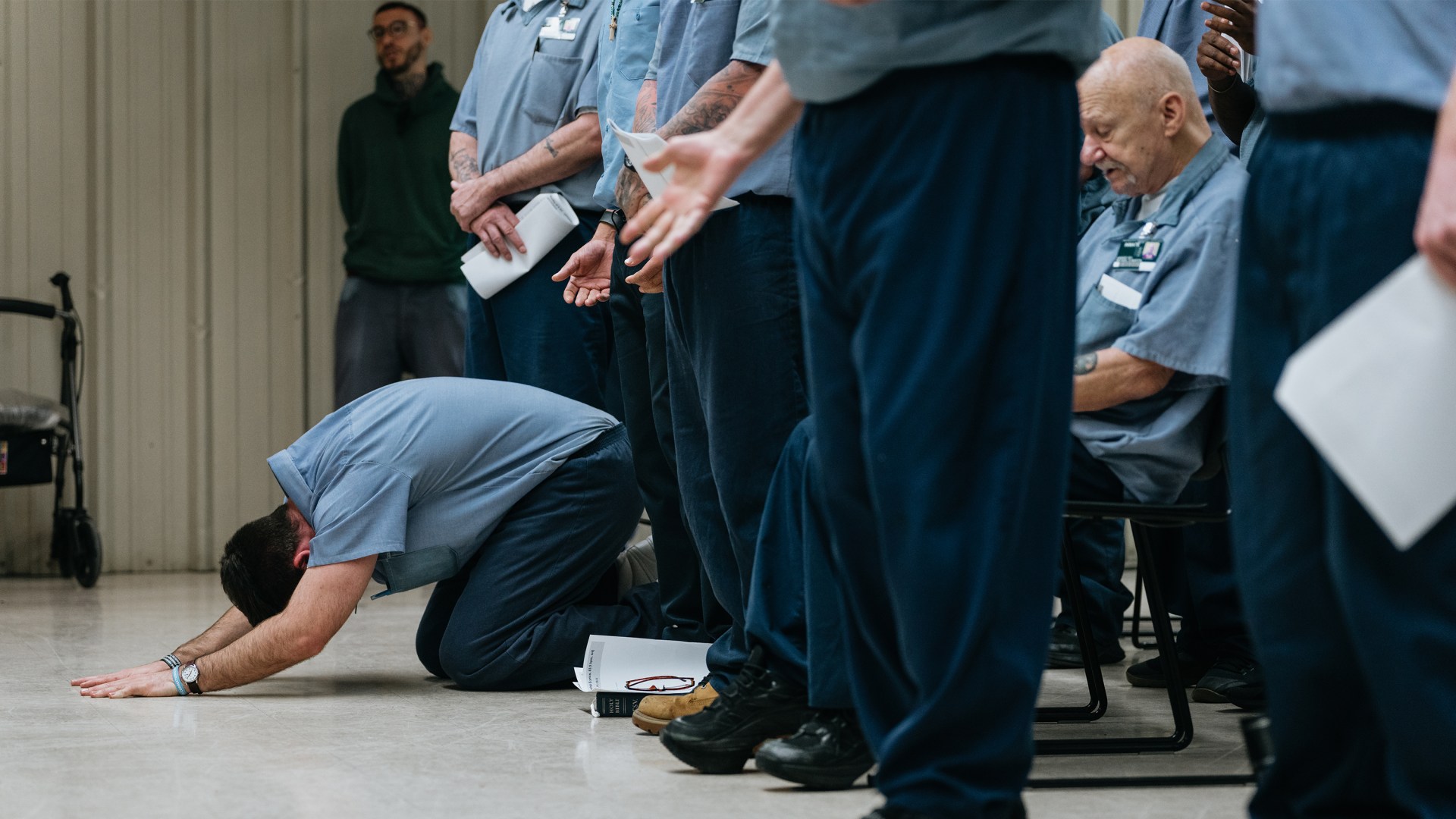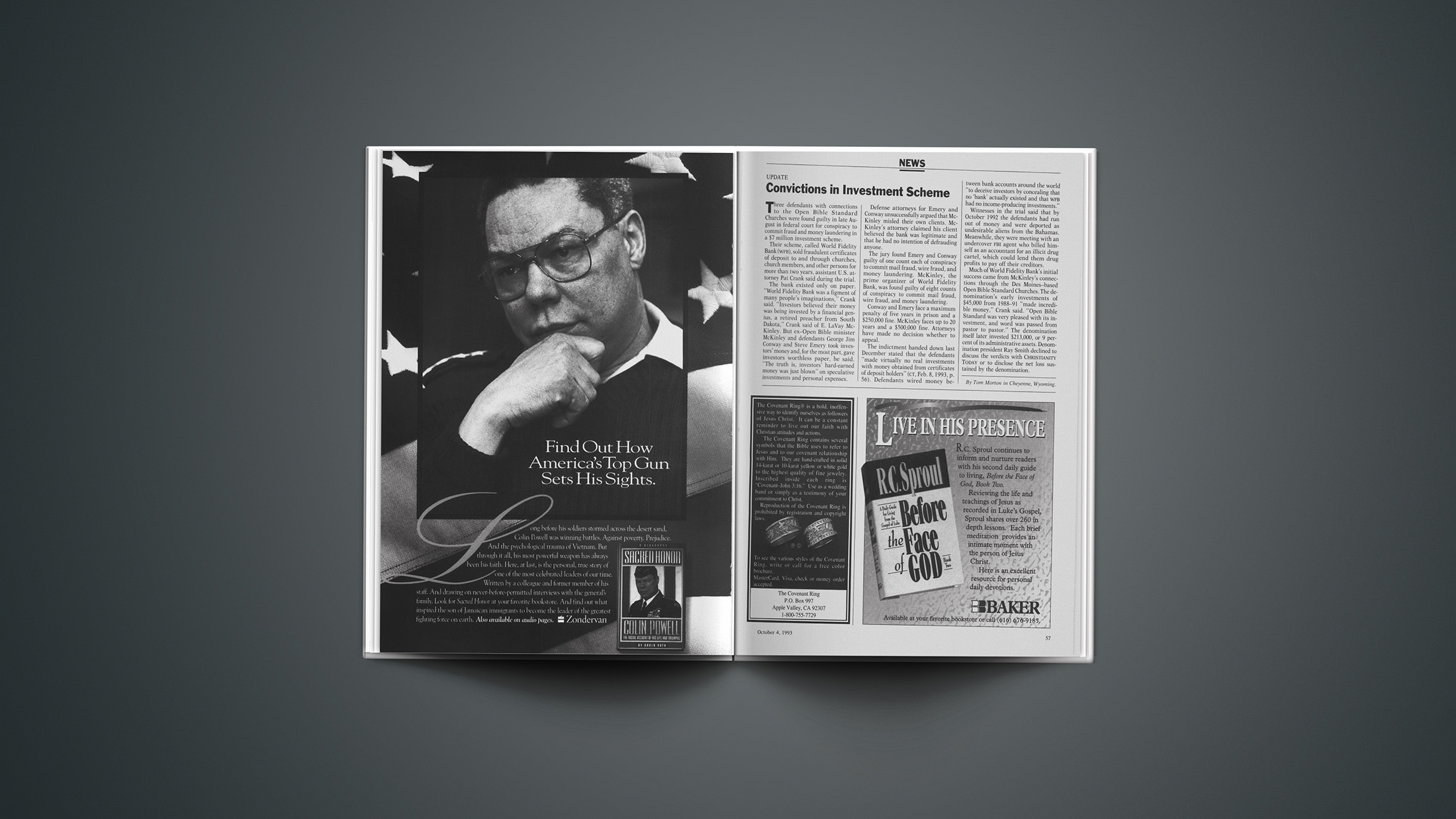To reach the chapel at the Chillicothe Correctional Institution in rural southeast Ohio, volunteers from the worship team at Rock City Church navigate a maze of checkpoints.
First, they sign in and show identification. One state prison official stamps their hands with invisible ink before another inspects the marks with a black light. Then they lug their instrument cases, amps, and coils of thick black cables behind an escort through a series of huge iron doors that beep like a game show buzzer before letting them in.
Rock City, a nondenominational megachurch based in Columbus, Ohio, started hosting worship nights at Chillicothe during the pandemic. Unable to come inside, they’d set up their equipment outside the prison fence and sing from the grass.
Prison officials eventually contacted Rock City pastor Chad Fisher—not to complain, but to ask for more. They noticed the music was having a positive impact on those incarcerated.
Rock City has run a prison ministry for years but had struggled to win over hesitant officials in several state facilities. That changed with the pandemic.
“We started getting calls left and right from prisons,” Fisher remembers of early 2020. “They were saying … ‘If you’re willing to give us your weekend service, worship, and message, we will show it to our entire population within the walls.’ ”
Rock City now sends footage of its Sunday service to 17 state and federal prisons around Ohio, along with a regular team of volunteers who worship alongside the incarcerated people. Most weeks, Fisher begins his sermon by welcoming those watching online, including “those watching from a prison cell.”
It’s not every day the government requests more church involvement, but prison ministry is a growing exception. As the rates of violent incidents, deaths, suicides, and drug overdoses inside prisons continue to rise, overwhelmed corrections departments are desperate for help. Volunteers from churches and prison ministries across the country, as well as government officials and prison chaplains, say Christian ministries are changing prisons for the better.
Part of this is an odd result of the pandemic. Before 2020, mostly larger and wealthier churches were investing in the technology to record or stream their services. But the lockdowns led to a livestream explosion.
That led to a correlating uptick in the number of churches wanting to partner with God Behind Bars, a Nevada-based ministry that recruits churches all over the country to plant campuses inside nearby prisons by sending weekly footage of their services along with volunteer teams.
When a church signs up and government officials agree, God Behind Bars buys whatever equipment the prison needs—TVs, speakers, network upgrades, every extension cord within a 100-mile radius—and donates it all to the prison. God Behind Bars president and CEO Jake Bodine said this usually costs around $150,000.
God Behind Bars also bankrolls special events, including “family reunification” parties, in which the children of those in prison are invited to spend a few hours with their parents—some of whom they haven’t seen for years—enjoying food, music, and games.
Some prisons require prisoners to show good behavior before they’re allowed to attend. Raeanne Hance, the global director of corrections and community organization for God Behind Bars, said prison ministries’ impact on behavior is well known.
“Anybody who’s in the department of corrections at all knows that the more programs inmates are in, the more peaceful the compound will be,” Hance said. “Officers have told us, ‘Come in, do more and more events, because my compound is quiet and safe for the next two weeks after you leave.’”
However, Hance and other Christians going into prisons point to a deeper transformation. Prison culture improves, they say, because the gospel changes hearts.
Valorie Bradley spent six years in a Tennessee prison for embezzlement before her release a little over a year ago. While serving time, Bradley began going to the prison gym every Thursday night to watch the weekly services from Cross Point Church, a God Behind Bars partner in Nashville. Bradley said the church, especially the volunteers who came week after week to watch the services and pray with her, changed her life.
“It’s like walking out of a fire into a safe haven. … That’s what we got on Thursday nights,” she said. The “fire,” according to Bradley, was a world of drugs, anger, and fighting that constantly smoldered inside the prison.
“It’s a struggle to live like Christ in there,” Bradley said.
Many ministries emphasize the practical benefits alongside the spiritual. Prison Fellowship, the largest and most influential evangelical prison ministry, said its Academy, a yearlong program that teaches life skills, has been shown to reduce recidivism rates, making it an attractive program to state officials.
“Independent research showed one Prison Fellowship Academy site had a 9.65 percent recidivism rate, whereas the national recidivism rate is 68 percent,” said Heather Rice-Minus, an executive vice president at Prison Fellowship.
But recidivism isn’t the only problem state corrections officials face. Statistics suggest kids with incarcerated parents are six times as likely as the broader US population to one day be incarcerated themselves. That’s what motivated Bodine and God Behind Bars to launch their family reunification events.
“Our goal is not to just focus on this current population, but really the entire generational legacy, with leading their mom or dad to Christ while incarcerated … and allowing Mom or Dad to be that Christian influence in their kids’ lives before they’re released,” he said.
When Bradley went into prison, she left behind six grandchildren. Aside from her relationship with Jesus, she said, the biggest impact God Behind Bars made in her life was helping restore those family relationships.
At a recent event in a women’s prison in South Carolina, God Behind Bars staff member Isaac Holt said he watched as one mother reunited with her son for the first time in many years. When she was incarcerated, he was just four. Now he was a strapping 15-year-old.
“It was the craziest thing,” Holt said. “She ran up and jumped into his arms, and he caught her. … She was crying the entire time,” he said.

Sometimes the extended time apart and the emotional baggage of incarceration make these reunions tense. Meeting face-to-face can’t always solve the hurt that has accumulated over the years. Holt has also seen people devastated when their family members don’t show up despite having RSVPed. It’s hard for some prisoners without visiting family to watch others hugging and laughing with theirs.
Sometimes parents don’t know what to talk about with children they barely know. God Behind Bars tries to help break the ice in whatever ways they can.
That night in South Carolina, volunteers set up an ice cream sundae bar, with an array of flavors and toppings. As Holt watched moms spoon the ice cream into their children’s bowls, he noticed something fascinating.
“You’ll hear a mom be like, ‘Do you want M&M’s?’ And the kid will say, ‘I don’t like M&M’s,’” he said. “They’re finding stuff out about their kids. And that’s actually really exciting for them.”
None of the chaplains or volunteers interviewed for this story had any personal connection to prison. None had been incarcerated or have family who were. Each said the same thing when asked why they minister to prisoners: I don’t know. God just told me to.
Prison officials may see the tangible outcomes of ministry outreach in the behavior and attitudes in their facilities. The churches see eternal implications.
Recently, Fisher received a letter from a man on death row in Ohio, complimenting his sermon and recalling Jesus’ love for Mary Magdalene.
“I wanted you to know I’m not the only guy on the row that watches,” he wrote. “Our crimes are some of the worst there are, but thankfully I can take joy in knowing the Lord forgives me even if people never will.”
Maria Baer is a contributing writer to CT based in Columbus, Ohio.














